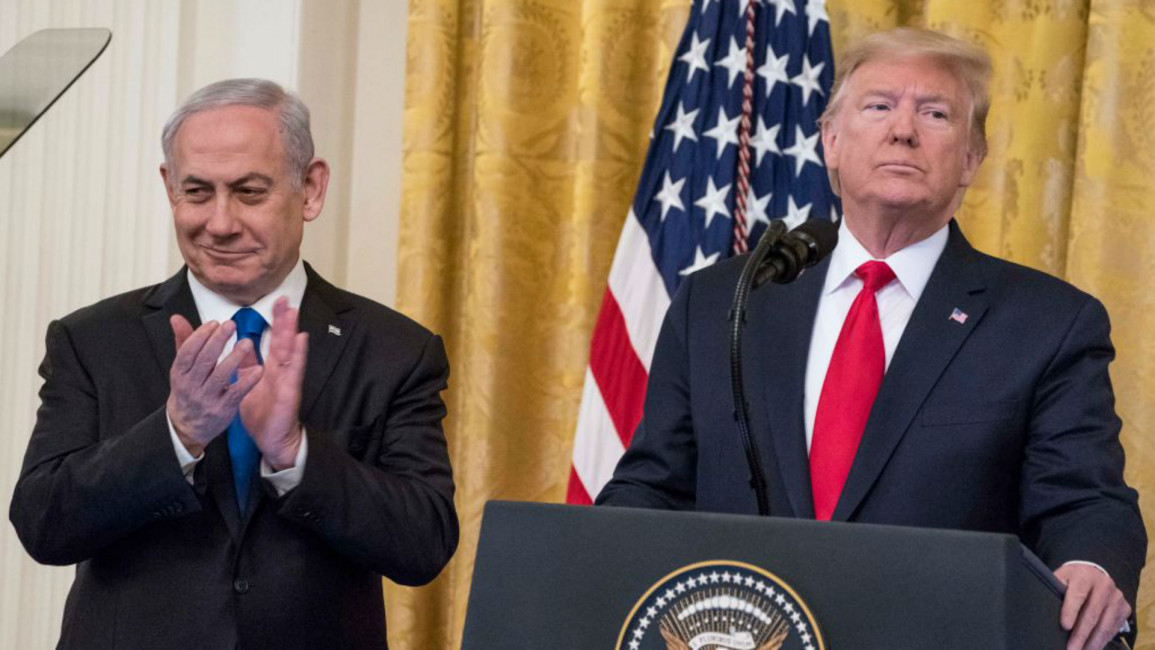
Gulf leaders can't ignore public opposition to Trump's sham 'peace deal'
In addition to the obvious absence of any Palestinian representatives, the only Arab countries represented by their ambassadors at the announcement of the deal at the White House were from the GCC, with the ambassadors from Bahrain, Oman, and the United Arab Emirates (UAE) in attendence.
Notably, neither Egypt nor Jordan sent representatives, despite the fact they are the only two Arab states to have peace treaties with Israel.
The presence of these Gulf states at the event, then, is worth examining, as are broader efforts at normalisation between the Gulf states and Israel - a subject that has garnered greater attention in the past few years.
Popular opinion in the Gulf surrounding the Palestinian issue cannot be ignored, even by authoritarian governments that may want to support the plan to bolster their ties with the Trump administration. It is unsurprising, then, that those GCC states that attended the White House unveiling of the plan have since backpedalled their support.
In the week since the announcement of the plan, it has been nearly universally rejected in the Arab world. Indeed, on 3 February, the Organisation of Islamic Cooperation (OIC) in Jeddah formally rejected the plan. Similarly, the Arab League rejected the plan, reaffirming their commitment to the Palestinian state on 1967 borders with the capital of East Jerusalem.
 |
Those GCC states that attended the White House unveiling of the plan have since backpedalled their support |  |
Egypt, Saudi Arabia, and the UAE had initially urged consideration of the plan, but, seeing the intransigence of their neighbours and the overwhelmingly negative popular response domestically, may reconsider their stances.
Perhaps the biggest challenge facing the GCC is a means of maintaining their relationship with the Trump administration, particularly as tensions with Iran increase, while not alienating their domestic populations with support for the plan that is pretty much universally unpopular in the Arab world.
For Bahrain, Oman, and the UAE, normalisation, and consideration of the plan as part of that, is a means of maintaining good ties with Trump. Further, as has been documented elsewhere, Trump's son-in-law and architect of the plan enjoys close personal ties with the Crown Prince of Abu Dhabi, Shaykh Mohammed bin Zayed and Saudi Crown Prince Mohammed bin Salman.
For its part, Bahrain, the weakest economically of the GCC and a close ally of Saudi Arabia, last year hosted the "Peace to Prosperity" workshop to launch the economic component of the plan constructed by Kushner.
| | |
Kuwait notably boycotted the event and since then has appointed its first ambassador to Palestine. More recently, since the announcement of the plan and as full details have been released, even those states that attended the unveiling of the plan are said to have expressed their rejection.
Interestingly, regional calculations are different for Oman. Israeli president Benjamin Netanyahu visited Muscat in November 2018, and Oman enjoys relatively peaceful relations with Iran.
As a result, keeping the Trump administration happy to protect against Iranian advances is less of a priority, and so maintaining its position as a regional mediator is more critical, or at least it was under Sultan Qaboos. Still, domestic public opinion that opposes the plan is unlikely to be ignored.
Beyond relations with Trump, Oman may consider that encouraging negotiations could be a means of enhancing their global soft power, especially in becoming known for interfaith dialogue and pluralism. The UAE in particular has in recent years pushed an agenda of "moderate" Islam; in its efforts to essentially de-politicise Islam it may choose to de-emphasise the Palestinian cause and focus instead on interfaith initiatives, which the UAE has funded in recent years.
In terms of the Saudi response to the presentation of the plan, Kristin Diwan has aptly pointed out the need for the Saudis to appeal to both their domestic population and the Trump administration, a challenge shared by its GCC neighbours as well.
While their formal statement encouraged the beginning of "direct peace negotiations," Saudi foreign minister Adel al-Jubeir has since then stated that "[w]e reaffirm our support for the Palestinian people in a manner that guarantees their legitimate rights."
 |
These inconsistent responses indicate a desire to answer domestic concerns about the plan |  |
King Salman also reportdly called Palestinian President Mahmoud Abbas to express a "steadfast stance on the Palestinian issue and the rights of the Palestinian people." These inconsistent responses indicate a desire to answer domestic concerns about the plan and not to isolate other countries in the region by supporting the plan.
Statements from Kuwait and Qatar have been the least supportive of the plan, despite their alliances with the United States. Indeed, both countries welcomed efforts to negotiate but urged the respect of earlier international agreements, particularly the acceptance of 1967 borders, a capital in East Jerusalem, and the right of return.
Kuwait has been the most vocal in its support for the Palestinian cause - which is likely not a coincidence considering it hosts the most powerful parliament in the GCC. In a state where voters influence policymaking, it makes sense that Palestinian solidarity is most palpable and most clearly integrated into state policies.
The reactions of the Gulf states demonstrate that the Palestinian cause is arguably the only viable transnational movement uniting the Middle East. As a result, negotiating that issue, one which has resonance with domestic populations around the Middle East, while maintaining ties with the Trump administration, will be difficult for its allies.
Dr Courtney Freer is a senior advisor at Gulf State Analytics and a research officer for the Kuwait Programme at the London School of Economics and Political Science.
Follow her on Twitter: @CourtneyFreer
Opinions expressed in this article remain those of the author and do not necessarily represent those of The New Arab, its editorial board or staff.




